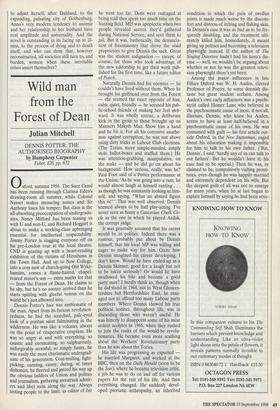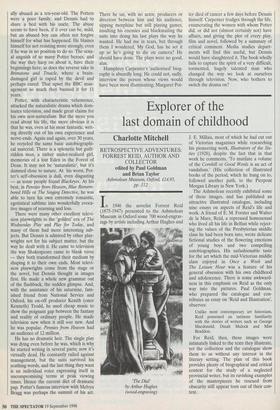Wild man from the Forest of Dean
Julian Mitchell
DENNIS PO 1 1 ER: THE AUTHORISED BIOGRAPHY by Humphrey Carpenter
Faber, £20, pp. 672
Oxford, autumn 1956. The Suez Canal' has been running through Clarissa Eden's drawing-room all summer, while Colonel Nasser makes menacing noises and Sir Anthony loses his temper. But class is the all-absorbing preoccupation of undergradu- ates. Nancy Mitford has been teasing us with U and non-U, and Richard Hoggart is about to make a working-class upbringing essential for intellectual respectability. Jimmy Porter is slagging everyone off on his pre-London tour at the local theatre. CND is gearing up with a heart-rending exhibition of the victims of Hiroshima in the Town Hall. And up to New College, into a cosy nest of church-going Old Wyke- hamists, comes a flame-haired, chapel- reared miner's son — extra marks for that — from the Forest of Dean. He claims to be shy, but he's no sooner arrived than he starts spitting with gleeful venom on the world he's just elbowed into. Dennis Potter's hair was emblematic of the man. Apart from its furious revolution- redness, he had the scorched, pale-eyed look of a puritan saint fulminating in the wilderness. He was like a volcano, always on the point of vituperative cruption. He was so angry at and with everything, so caustic and coruscating, so sulphurously, unforgivably scornful, so simply funny, he was easily the most charismatic undergrad- uate of his generation. Coat-trailing, fight- picking, cunning, canny, daring, at times dishonest, he fleered and jeered his way up the obvious ladders of Union and politics and journalism, gathering awestruck admir- ers and libel suits along the way. Always testing people to the limit, as editor of Isis he went too far. Dons were outraged at being told they spent too much time on the hunting field. MI5 was apoplectic when two people revealed secrets they'd gathered during National Service, and sent them to jail. But it was, bathetically, the denuncia- tion of freemasonry that drove the staid proprietors to give Dennis the sack. Great was the student indignation — except, of course, for those who took advantage of the new editorship to get their work pub- lished for the first time, like a future editor of Punch.
Naturally Dennis had his enemies — he couldn't have lived without them. When he brought his girlfriend over from the Forest — she seemed the exact opposite of him, calm, quiet, friendly — he accused his pub- lic-school friends of making her feel awk- ward. It was wholly untrue, a deliberate kick in the groin to those brought up on Manners Makyth Man. Show him a hand and he bit it. For all his corrosive anathe- mas against corruption, he was not above using dirty tricks in Labour Club elections. (The Tories, more simple-minded, simply stole ballot-boxes and stuffed them.) He was attention-grabbing, manipulative, on the make — and he did go on about his background. How serious, really, was he? Paul Foot said of a Potter performance at the Union, 'As he was going into a rant, he would almost laugh at himself ranting . . . as though he was constantly looking at him- self, and saying, "What an absurd figure this is!"' That was well observed. Dennis seemed always to be half play-acting. I've never seen as funny a Caucasian Chalk Cir- cle as the one in which he played Azdak, the corrupt judge.
It was generally assumed that his career would be in politics. Indeed there was a rumour, probably put about by Dennis himself, that his local MP was willing and eager to make way for him. Quite how Dennis imagined his career developing, I don't know. Would he have ended up as a Dennis Skinner, good for a laugh but not to be taken seriously? Or would he have swallowed his bile and become a good party man? I hardly think so, though when he did stand in 1964, not in West Glouces- tershire but Hertfordshire East, he man- aged not to offend too many Labour party members. Where Dennis showed his true political instinct, throughout life, was in discarding those who weren't useful. He was bitterly to disappoint some of his most ardent acolytes in 1968, when they rushed to join the ranks of the would-be revolu- tionaries. He became even more scathing about the Workers' Revolutionary party than he was about the Tories.
His life was progressing as expected he married Margaret, and worked at the BBC, then on the Daily Herald (soon to be the Sun), where he became television critic, a job he was to do on and off for various papers for the rest of his life. And then everything changed. He suddenly devel- oped psoriatic arthropathy, an inherited condition in which the pain of swollen joints is made much worse by the discom- fort and distress of itching and flaking skin. In Dennis's case it was so bad as to be fre- quently disabling, and the treatment ulti- mately killed him. Immediately, it meant giving up politics and becoming a television playwright instead. If the author of The Singing Detective hadn't had his hero's dis- ease — well, we wouldn't be arguing about whether or not he was the greatest televi- sion playwright there's yet been.
Among the major influences in late Fifties Oxford was W. H. Auden, elected Professor of Poetry, to some donnish dis- taste but great student acclaim. Among Auden's own early influences was a psychi- atrist called Homer Lane who believed in the psychosomatic cause of most, if not all, illnesses. Dennis, who knew his Auden, seems to have at least half-believed in a psychosomatic cause of his own. He was consumed with guilt — his first article out- side Oxford, in the New Statesman, raged about his education making it impossible for him to talk to his own father. (`But, Dennis', I said, 'hardly any of us can talk to our fathers'. But he wouldn't have it; his case had to be special.) Then he was, or claimed to be, compulsively visiting prosti- tutes, even though he was happily married and extremely dependent on his wife. But the deepest guilt of all was not to emerge for many years, when he at last began to explain himself by saying he had been sexu- ally abused as a ten-year-old. The Potters were a poor family, and Dennis had to share a bed with his uncle. The abuse seems to have been, if it ever can be, mild, but an abused boy can often not forgive himself for what has happened. He blames himself for not resisting more strongly, even if he was in no position to do so. The sexu- al anguish of so many Potter heroes, and the way they harp on about it, have their beginnings here; as does the reverse take in Brimstone and Treacle, where a brain- damaged girl is raped by the devil and perhaps cured. That upset the BBC man- agement so much they banned it for 11 years.
Potter, with characteristic vehemence, attacked the naturalistic drama which dom- inates television, and made great claims for his own non-naturalism. But the more you read about his life, the more obvious it is that he was, even at his most fantastic, writ- ing directly out of his own experience and nerve-ends. Again and again, over 30 years, he recycled the same basic autobiographi- cal material. There is a splenetic but guilt- ridden man, a rather under-realised girl, memories of a lost Eden in the Forest of Dean. It may not be 'naturalistic', but it's damned close to nature. At his worst, Pot- ter's self-obsession is dull, even disgusting — as some people found Blackeyes. At his best, in Pennies from Heaven, Blue Remem- bered Hills or The Singing Detective, he was able to turn his own extremely romantic, egotistical sublime into wonderfully evoca- tive images of yearning and loss.
There were many other excellent televi- sion playwrights in the 'golden' era of The Wednesday Play and Play for Today, and many of them had more interesting sub- jects. But Dennis is admired by other play- wrights not for his subject matter, but the way he dealt with it. He came to television the way Shakespeare came to blank verse — they both transformed their medium by shaping it to their own ends. Most televi- sion playwrights come from the stage or the novel, but Dennis thought in images first. He made a whole new grammar out of the flashback, the sudden glimpse. And, with the assistance of his saturnine, fam- ished friend from National Service and Oxford, his on-off producer Kenith (once Kenneth) Trodd, he used cheap music to show the poignant gap between the fantasy and reality of ordinary people. He made television new when it still was new. And he was popular. Pennies from Heaven had an audience of 12 million.
He has no dramatic heir. The single play was dying even before he was, which is why he started writing in several parts; now it's virtually dead. He constantly railed against management, but the suits survived his scathing words, and the last thing they want is an individual voice expressing itself in uncompromising terms at peak viewing times. Hence the current diet of dramatic pap. Potter's famous interview with Melvyn Bragg was perhaps the summit of his art. There he sat, with no actor, producers or directors between him and his audience, sipping morphine but still playing games, insulting his enemies and blackmailing the suits into doing his last plays the way he wanted. He had me in tears, but through them I wondered, My God, has he set it up so he's going to die on camera? He should have done. The plays were no good, alas.
Humphrey Carpenter's 'authorised' biog- raphy is absurdly long. He could not, sadly, interview the person whose views would have been most illuminating; Margaret Pot- ter died of cancer a few days before Dennis himself. Carpenter trudges through the life, enumerating the women with whom Potter did, or did not (almost certainly not) have affairs, and giving the plot of every play, film and novel, followed by a summary of critical comment. Media studies depart- ments will find this useful, but Dennis would have slaughtered it. The book wholly fails to capture the spirit of a very difficult, tormented, hugely talented man who changed the way we look at ourselves through television. Now, who bothers to switch the drama on?











































































 Previous page
Previous page